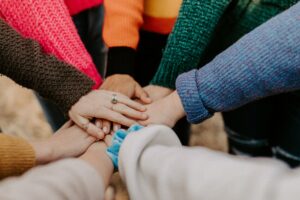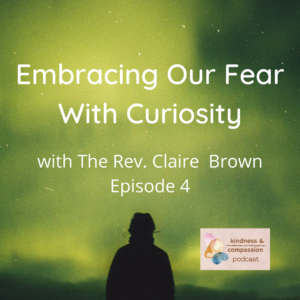 As counterintuitive as it sounds, does embracing our fear help us to show more kindness and compassion? In this episode of the podcast I am joined by The Rev. Claire Brown as we discuss her thoughts on befriending and being curious about our fear as a way to show self-compassion and empower ourselves.
As counterintuitive as it sounds, does embracing our fear help us to show more kindness and compassion? In this episode of the podcast I am joined by The Rev. Claire Brown as we discuss her thoughts on befriending and being curious about our fear as a way to show self-compassion and empower ourselves.
Meet The Rev. Claire Brown
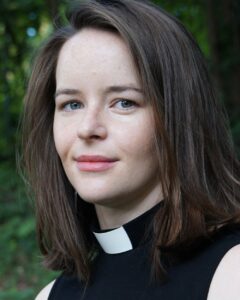 The Rev. Claire Brown is an Episcopal priest, writer, facilitator, and spiritual director. Claire is the author of numerous articles and book chapters, and is the co-editor of Keep Watch with Me: An Advent Reader for Peacemakers and co-author of New Directions for Holy Questions: Progressive Christian Theology for Families. She is a graduate of Vanderbilt Divinity School, the School of Theology at Sewanee, the Shalem Institute for Spiritual Formation, and Still Harbor. Find Claire at revclairebrown.com. She lives in Athens, Tennessee with her spouse and two young children. She is the rector of St. Paul’s Episcopal Church in Athens, TN.
The Rev. Claire Brown is an Episcopal priest, writer, facilitator, and spiritual director. Claire is the author of numerous articles and book chapters, and is the co-editor of Keep Watch with Me: An Advent Reader for Peacemakers and co-author of New Directions for Holy Questions: Progressive Christian Theology for Families. She is a graduate of Vanderbilt Divinity School, the School of Theology at Sewanee, the Shalem Institute for Spiritual Formation, and Still Harbor. Find Claire at revclairebrown.com. She lives in Athens, Tennessee with her spouse and two young children. She is the rector of St. Paul’s Episcopal Church in Athens, TN.
How Do We Embrace Fear In Our Lives?
For many of us over the last 2 years, we have all experienced fear as a result of the COVID pandemic. As Claire put it, “fear has been driving the bus…”. And it has impacted us at different levels depending on our own life situations. Parents worried about their young children who can’t be vaccinated, people with chronic illnesses, and all the other people that are most vulnerable have been especially affected with the fear the virus has brought us.
As a leader in the Church world, Claire speaks about how much of this has been uncharted territory for those in leadership. After all, at the core of what it means to be “Church” is the absolute necessity of having community. It has been about finding the balance between the need for keeping people safe and at the same time helping meet people’s spiritual needs and the need for contact with other people.
Claire tells of a person in her care that has advanced lung cancer. So for that person, getting COVID feels like a death sentence. She also sees folks who have children that are suffering in isolation. Then there are the people that fear losing their community and the church life they love so much. At its core is the fear of loneliness.
Through all these conversations, Claire is trying to stay focused on what fear may be communicating to us. After all, fear does serve a biological function in that it serves to protect us. But when we allow fear to drive everything we do, essentially our amygdala takes over.
Essentially, a step toward embracing our fears comes from allowing ourselves to be vulnerable. It means acknowledging our own fear and the fear of others, because to be confrontive.
Taking A Curious Approach
“Staying curious about what fear is communicating is really important”
In those times when we are feeling fearful of others, one solution seems to be in taking a curious approach. In other words, acknowledging the fear we are feeling and what it is communicating to us about ourselves and our community.
Find Ways to Have Reparative Moments
We need to build in reparative moments as we move through our fears. For example, having a good laugh or a good cry are ways we can repair the damage of fear. Movement, exercise, and breath work are also ways to repair the fear and grief we are experiencing.
By building in these practices within the activities of our communities, we give people ways to heal from the fear they are experiencing. Being outdoors for activities helps us reconnect on many different levels.
“By building in small reparative moments of joy, laughter, and rest are the ways in which we build our capacity to stay open and curious”.
Finding New Paths and Possibilities
So many of us are fearful of losing our past ways of doing things. We see this kind of fear all around us. And with the COVID pandemic, we fear that things will never be like they were. With the isolation and distance we have had, we fear the change that it brings. Claire says, “We are out of step with old patterns that used to serve us, and still trying to build new ones”.
Hope comes through when we think about the new possibilities of reconnecting and repairing those things that have brought us hurt and fear. By acknowledging our fears and allowing ourselves to be mindful and vulnerable, we can find healing and hope. When we curious about our fear and the fear of others, we can find new paths and possibilities in our relationships.\
Being Curious is The Key To Embracing Our Fear
In relationships we can get into patterns of criticism and defensiveness. The way to counter act this is by learning to be curious about what is happening for the other person instead of simply defending our own point of view. When we understand the “backstory” of others, and get furious about that, it gives us room to have kindness and compassion.
Doing this takes practice. Being curious is not a natural thing for us to do when we are fearful. But when we can be mindful enough to be curious, it opens up pathways for healing that we might have missed if we stay in our fear.
Parting of The Red Sea
Claire shares the metaphor of Moses parting the Red Sea and the connection it has with our fears. She talks about some of the incredible artwork we have seen of creatures behind this wall of water. She says about fear, “We are going to carve out this space, that still feels quite treacherous, but yet it is still enough of a path for us to walk on. That curiosity has this power to split open the possibilities and make a pathway for us to walk on together.”
Conclusion
Ultimately our fear can be very informative. As Claire mentions in this episode, our fear can protect us. But at the same time it can cause us to be separated from others. When we get curious about what our fear is telling us, it can be the path to finding connection and hope. And it can also be the path for kindness and compassion.
Claire (00:00):
Whether that's, whether that's geographically objectively true, or part of the story in that narrative, there's this image that he walks the people through and I've seen some really incredible artwork that tries to imagine what it would be like to walk through. And maybe you could look up and see this wall of water and creatures behind it, or some like that. Yeah. But almost the sense of we're going to carve out this space that still feels quite treacherous. And yet it's a, it is enough of a path for us to walk on,
Gordon (00:40):
To the kindness and passion podcast, where we will explore the intersection of psychology science and spirituality. My name is Gordon brewer and I'm a licensed psychotherapist and mental health provider. I have spent my career helping people learn how to better manage their emotions and find more meaning in their lives and connection in their relationships. Join me as we think and talk about the ways we can find happiness and be content in our lives, through the practices of kindness and compassion. We will talk with other experts in the fields of psychology, science and religion. I'm so glad you're with me on this journey as we learn how to be at peace with ourselves and others.
Gordon(01:36):
Hello everyone. And welcome to this fourth episode of the kindness and compassion podcast. I'm Gordon Ru glad you've joined me in this journey. Glad you're listening to the podcast and hope you'll take time to follow us or subscribe to the podcast wherever you might be listening to it. So I'm, I'm excited for you to get to hear from my guest today. And, um, that is the Reverend Claire brown and Claire and I delve into this whole topic of fear. And how do we embrace our fear and how do we get curious about our fear? And I think that you'll find this probably an in interesting conversation, you know, kind of the convention is, is that when we're faced with fear, you know, kind of the old adages is you've gotta conquer your fears. Well, we wanted to challenge you to maybe take a little bit different approach to that of learning, how to embrace your fear versus conquering your fears.
Gordon(02:36):
Because I think as we've all learned over this last two or three years with the COVID pandemic, is that there's a lot of fear out there and, um, not only fear around the virus itself and how it can impact us and those we love, but also there's been a lot of fear just politically and just within our society, um, on, on any number of fronts, either P politics, um, the black lives matter movement, uh, with the advent of George Floyd's, um, untimely death and murder. Um, and just all of that has created a, created a lot of fear within our society. And so Claire and I kind of tackle this, this topic, and I will say that it's from kind of the perspective of our, both of us, our clergy people within the Episcopal church. And so we have a little bit of bias in that direction.
Gordon (03:37):
And so I just want to be transparent around that. That doesn't mean that that's the only path to discovering how to live a life of kindness and compassion, but that's the context to, through which I know Claire and how we have, um, kind of entered into this conversation. So, um, I invite you to listen in as Claire and I talk about embracing our fear and how to be curious about our fear, but before we get to that, one of the things that I would like to invite you to do is to check out our Patreon page for those of you out there that are listening to the podcast. And if you'd like to support what we're trying to do here with the podcast, that is a great way for you to do it. And if you will go over to kindness and compassion.com/patreon, or you can just go to kindness and compassion.com and you'll see a, a, a, a up in the menu, a place for you to click, to get to our Patreon page. And that's just a way for you to show the love, give us your support, uh, through just a donation. We have, uh, three, three different membership levels. And I think they're set at $5 a month to $15 a month or $25 a month. So hopefully for, for people that's affordable and we appreciate the support to be able to continue to do this work and this project that has started with the kindness and compassion podcast. So, uh, without further ado, here's my conversation with the Reverend Claire brown.
Gordon (05:22):
Well, hello, everyone. And welcome again to the kindness and compassion podcast. And I'm so glad and excited to have my first guest. Well, no, that's not quite true. I had another guest, but this is my first guest outside the therapy realm to join me brown. The Reverend CLA Claire brown is joining me today. Hi Claire.
Claire (05:47):
Hi Gordon. Thanks so much for having me
Gordon (05:49):
Well, I'm, I've been looking forward to this and as I've gotten to know Claire over the last few years, um, she is just one of those people that, to me, exudes kindness and compassion, um, and not to put you on the spot, Claire, but, and I know we've had a lot of deep conversations just with our mutual work within the Episcopal church and been particularly the diocese of east Tennessee. But Claire is the rector, which is, uh, an Episcopal term for pastor, I guess, to some degree of St. Paul's church in Athens, Tennessee, but Claire, why don't you begin by just telling folks a little bit about yourself and how you've landed, where you've landed?
Claire (06:31):
Sure. Well, um, it's a, it's a delight to answer that question with you, because of course you were part of the commission on ministry when I was discerning a call to priesthood. So, um, you have a, a not insignificant role in the story of how I landed, where I landed. Um, yeah, so I'm in Athens, Tennessee, which is a small town, uh, in a rural county between Chattanooga and Knoxville, Tennessee in, and I, um, moved here and started this call not quite a year ago. And before that was serving as an associate priest in a parish in Chattanooga. And I also do some writing and some facilitation, and, um, got into all this work wrestling with a call that really emerged in childhood, um, to be somebody who asks big God questions and helps others do the same. Um, it took me many years of searching to find a home in the Episcopal church, a tradition that seemed to make enough room for the big questions I was carrying and also enough room for me as, um, a woman with a call. Um,
Gordon (07:44):
Right.
Claire(07:46):
And I should say too, I'm married to Austin sory. Who's the, uh, interim executive director of, um, statewide organizing and community empowerment in Knoxville, Tennessee. And we have two little boys, five and two who we are trying to raise to be agents of kindness and compassion in this world.
Gordon (08:08):
Right, right. Uh, yeah, I, I love, uh, yeah. It's, as I said earlier, I've love getting to know Claire and, uh, learning, learning more about her and just what she he's doing as a, as a mom, a priest, uh, you know, just a, an agent in the world of trying to spread kindness and compassion. And one, one of the things that Claire and I had kind of chatted about via email before we started, uh, this particular episode was the topic we wanted to discuss. One of the, what came up was just, and I think this is a great topic is how do we embrace fear within our lives? And, um, because I think one of the things about kindness and compassion, at least in a way that I think about it, is that an opposite of that maybe a go-to opposite of that would be anger. And I think about fear as being kind of the driver of anger. And so Claire share with folks kind of what you've been thinking about around in embracing fear and how it relates.
Claire (09:18):
Yeah. So when I think about my relationship to fear in the last couple of years, it's deeply tied to the COVID 19 pandemic. Um, I have found myself, uh, in very odd position that you are too, and others are too of being a convener of people in physical space in a time when we have not known how to do that, um, without fear. And so, um, thinking back to the beginning of the pandemic, um, I was in, and a situation of being a support in leadership in a congregation that we knew had, uh, potentially been exposed to the virus. And this was a, you know, we have to take back our, our goggles of what we know in 2022 that we didn't know then, right. But we were trying to do risk assessment with very little data and be spiritual, peaceful, loving pastoral leaders in unknown territory, um, when fear was really driving the bus for all of us.
Claire (10:35):
Um, and so that's just been a, a really alive question for me in the last two years, is, are we making our decisions out of care for each other or out of fear of the unknown? Um, and are we making decisions with the most vulnerable folks in mind, remembering that our levels of fear around this virus vary for really good reasons. Um, those of us who are caretakers of children who can't yet be vaccinated, have a different fear calculus, right? Um, those of us who live with chronic illness have a different set of concerns to consider. And those of us whose, uh, call and livelihood is to go into hospital rooms and nursing homes to go into gatherings of people and speak with them and lay hands on them and feed them the sacrament have to ask a different set of questions. So it, it's an evolving one too, for me. Um, as we learn more and as we consider where we're headed, um, and in some ways it feels like a learning lab for the kind of fear that leaders in unknown places have to grapple with all the time.
Gordon (12:05):
Right. Right. Yeah. That's a, it's, it's a, it's a tough place. And we, I think when I, when I think about fear kind of the go to maybe is to think about confronting the fear in other words, being able to just push it away or somehow, or know negate the fear, but I like this idea of being able to embrace it and accept it and that we can, we can actually, you know, it's a place of vulnerability, number one, in that, and in, and in my, and in my view at least is that vulnerability is the thing that finds us together. And that we, you know, just to going back in time in ancient history, the reason the human race survived is that people recognize their vulnerability and they gathered together. And so that was that, that's the thing that is a struggle and that being able to be kind of people that are fear.
Gordon (13:16):
Um, and I think another thing that I struggle with is how do you be kind, how are you, how can we be kind to people that have different ideas about what is safe and unsafe? Mm. And that sort of thing. And just, uh, and that's a, you know, get us again. One of my, the purposes of this podcast is wanting to kind of end that polarization. So in, in your, in your work, just in the community and in your congregation and all of that, how have you dealt with kind of differing opinions and being able to yeah. And, and even deal with people that have vastly different ideas about how to handle things.
Claire (14:04):
Ooh, that's a great question. So not perfectly is the first answer. Yeah. That's coming to mind, You know, I think staying curious about what fear is communicating is really important. Um, I hear from folks who are afraid of being infected, um, someone very dear to me that I, that I'm trying to hold, uh, has advanced lung cancer for that person getting COVID is, feels like a death sentence.
Gordon(14:46):
Right.
Claire (14:47):
On the other hand, I've got folks who are seeing their children suffering in isolation. I see folks who are worried that, um, we are losing sight of our call, or we are being excluders and those are based in fear too.
Claire (15:09):
Um, I think one of the things that I find myself talking out with my vestry in Sunday school weaving into sermons and conversations is actually probably scooting a little out of my lane into your Gordon and talking about, um, that in our psychological wellness fear is really important. It's a fear, a fear that protects it's a hardwired biological resource for us. Right. Right. And that, I think part of, well, I would say part of our call in for instance, Christ's teachings about forgiveness and turning the other cheek, uh, his teachings about the be attitudes is a call not to let our a amygdala impulse run the show.
Gordon(16:03):
Right.
Claire (16:04):
And so to stay curious about the fears that drive us, um, whether it's a fear of illness or a fear of losing our community, whether it's a fear of loss of an institution or decline, um, or a, a fear of our own loneliness and the space that has emerged for us to maybe have to confront our own selves in periods of isolation, staying really curious, so that we say, what is this communicating? And is that communication of our fear, this, this bio impulse, the yeah. The racing heart and the sweaty hands, and the, I need to take off and run is what that's actually communicating, something that we hold onto, or is it something that we filter through that and gospel of love and courage.
Gordon (17:02):
Right, right. Yeah. And it's a, you know, you know, what comes to mind for me, uh, immediately as you're describing that is just the, the practice of mindfulness and then being able to be mindful as a community, not only as individuals, but as a community of being able to say, you know, yes, we're afraid this is fearful stuff. And, but I think they, you know, the kinda the, again, using that, that language of the good news is, is that we're not alone in this and that. And I think that, you know, fear drives a lot of what people do, but also not only fear, but the fear of loneliness and being disconnected is what drives most of the not to get too, too far over into the psychological lane. But the, at least in my view, I think that any addiction, whether it be substances, sex, gambling, whatever the addiction is, is driven by a sense of loneliness.
Gordon (18:14):
And I think that people use substances and, and other things in their life to numb that feeling of loneliness, as opposed to learning, to sit with it and being able to kind of, um, you know, sit with a discomfort of those things. And, you know, when we're uncomfortable, I, you know, I'm just remind, uh, I think of this metaphor of when, um, you know, with your kids when, when they are afraid or when they are uncomfortable in some way, the go to is to, is to, is to wrap your arms around them, to cuddle 'em, to hold them and to give some sort of reassurance. And so I think at least in my mind, that's how we try to, um, practice kindness and compassion in, in our communities. Yeah.
Claire (19:12):
One of the things I've been mindful of, um, speaking of mindfulness. Yeah. Noticing, staying curious about, um, is how to, in my, in my work, in my personal life, in my family build in, um, reparative moments, um, I read a book toward the beginning of the pandemic that was super helpful for me. Um, and it was appropriately titled burnout. Um, and it talked about the ways that you can complete the physiological stress cycle. Um, and it's, it's things that I thought, well, of course I knew that I just hadn't connected the dots, you know, having a huge laugh is actually a, it, it has physiological impact on your stress, uh, letting yourself cry it out, move movement and exercise, uh, looking at all these sorts of very concrete practices, uh, breath work, and finding to weave that in again, in preaching in Sunday school, in, uh, we had our, rather than doing a week long vacation Bible school at the church, we did weekend Bible school and invited the adults and made it really intergenerational.
Claire (20:27):
And we did a lot of body movement going for a walk in the park was one of our set activities, um, trying to figure out how can we in, in whatever our daily call and life is, build in smaller moments of repair of joy of rest, um, because that helps build our capacity to stay open and curious, um, to stay connected to ourself and others. Um, yeah. And, and, uh, and, and also recognizing that at this point, many of us are out of, um, we're out of step with old patterns that used to serve and still trying to build new ones. So trying to, to weave that in, um, I have a lot more kitchen dance parties with my children than I used to cause we need, we just need to, to schedule it almost. Right.
Gordon (21:27):
Right, right. Yeah. Yeah. So yeah, the, you know, the, the, the one word that you have said as we've been talking that I think is key to being able to, um, embrace our fears is the word curious. And, um, you know, I just think about in my work with couples, you know, kind of, again, not to go too far down the therapy path here, but, um, one of the patterns that couples will get into, um, is patterns of criticism and defensiveness with each other. Sure. And one of the, one of the ways to, to counteract that is we find ourselves going on the defensive and we find ourselves kind of putting up that fear if you will, is to really begin to get curious about the other person. And so I think that's one, one kind of good take home point here with just thinking about how do we handle the fear that we experience that not only throughout the pandemic that we've gone through, um, but also just in dealing with each other through a lens of kindness and compassion is, is we have to first get curious about what's going on with other people.
Claire (22:49):
Mm, yeah. Yeah. Well, in that curiosity when it's not, uh, when it's, uh, pure, I guess when it comes from an earnest place, even if that's takes a lot of discipline for us to stay there. Right. Um, and is not a natural posture, it's still worthwhile, even if you gotta work on it, right. Maybe more worthwhile, it seems to carve out some space. Um, for some reason, when, when you were speaking Gordon, the image that came to mind was, um, this is so bizarre, but I'm gonna go with it was Moses parting, the red sea,
Claire (23:28):
And this idea of this powerful ocean, whether that's, whether that's geographically objectively true, or part of the story in that narrative, there's this image that he walks the people through. And I've seen some really incredible artwork that tries to imagine what it would be like to walk through. And maybe you could look up and see this wall of water and creatures behind it or something like that. Yeah. But almost the sense of we're gonna carve out this space that still feels quite treacherous. And yet it's, it is enough of a path for us to walk on. Yes. And that curiosity has this power to split open something that feels hopeless and overwhelming and impasable, and make a pathway that we could walk through together.
Gordon (24:23):
Oh, wow. I love that. I love that. Yeah. I love that metaphor. And that's, you know, that's, uh, as we, as we like to say in church, we church folks like to say that'll preach. Yeah. So, well, Claire, I wanna be respectful of your time. And I'm so glad we got this spend this time together, and I'm, I'm sure we'll have further conversations hopefully on this podcast, in the, in the future, if folks want to reach out to you, um, I guess, first of all, tell them about your books and some of the things that you're doing with your podcast and, and that sort of thing, and how they can get in touch with you.
Claire (25:06):
Sure, sure. So, um, I'm the co-author of two books. One came out a few years ago and it's called keep watch with me an advent reader for peacemakers. So it's for the liturgical season of advent, which is actually all about walking through the darkness for trust that God's light is on the other side. Um, and that was, uh, a collaborative work with, uh, lots of different contributors and spiritual practices and prayers all through. So, um, I, I'm still coming back to it every year and receiving the wise words from others that were part of that. And then this year, um, I, co-authored a book, um, called new directions for holy questions, progressive Christian theology for families. And, um, it's a book of big God questions and making space for wondering, and having hard talks, um, with kids about God, um, all through a progressive faith that is, um, committed to L G B T affirming. Um, and anti-racism while also being Orthodox and Christian. So yes. Um, folks can find out more about those or my facilitation work, um, or reach out, um, about spiritual direction or other things that I've got going on at rev, Claire brown
Gordon (26:31):
All right. And we'll have, uh, links in the show notes and show summary for folks to find that easily, the books and, uh, how to get in touch with Claire. So Claire, any, any quick closing thoughts that you have,
Claire 1 (26:45):
Uh, stay curious and stay open. Your fear is not your enemy.
Gordon (26:51):
Yes. I love that. So thanks Claire. We'll be talking again. I'm sure.
Claire(26:55):
Thanks cord.
Gordon (27:10):
Well, such a huge thanks to Claire for being on the podcast. I was so excited when she responded and, and decided to join me on this, uh, this journey. Uh, you know, this, this whole cast is really an experiment and I'm really doing it out of a place of kindness and compassion, not to sound too cheesy, but that's really, my hope is that that this podcast will give people things to think about and how they can kinda live into more kindness and compassion in their lives. Um, certainly with, uh, some of the guests you'll hear from me are, you know, through my church connections. And, um, but I'm hoping to, to get a well rounded viewpoint around kindness and compassion from any number of faith, traditions, psychology traditions, or those folks that are in science and, and that sort of thing. So you're are gonna be hearing hopefully a diversity of messages around this topic.
Gordon (28:09):
Uh, but you know, I, I think for me, the take homes that I got from Claire is that the importance of being curious about those things that bring us fear rather than trying to necessarily run from it or eradicate, uh, of just getting curious and mindful about those things that, that cause us fear. And, and I've seen it in my own work over and over again, that when we, when two people that maybe are in conflict can begin to get curious about the other person's story or their back story. So to speak it change the way we think about those people, because I think a lot of times we just deal with each other superficially. And I think the key to kindness and compassion is to be able to be willing, to be vulnerable and to take a deeper dive within our relationships and in our conversations with each other in interactions.
Gordon (29:04):
So thanks again, folks for being with me, um, and joining and listening into the podcast. As I mentioned, uh, take time to follow us wherever you might be listening to the podcast or subscribe, however, however they list it wherever you listen to that. I know apple podcast recently changed it from subscribe to follow. And I, I know on Spotify and Amazon and other places like that, where the podcast is located, you can just simply follow us. And, uh, thanks again for joining us and also be sure and go to the website, kindness and compassion.com, um, getting some resources together on the website for ways for people to begin to explore this topic and be able to have some resources in doing that. And you can sign up for our email list. I'm gonna start sending out regular emails, um, with just some resources and for people to connect and, and learn more about this whole topic of kindness and compassion.
Gordon (30:07):
And if you like what you're hearing, I'd love for you to be a patron and you can go over to our Paton page. And again, if you go to kindness and compassion.com up on the menu, there's a, a link there for you to a patron, or you can simply go to kindness and compassion.com/patron. Um, and, um, thanks again for being with me on this journey and looking forward to my future episodes. I've got an upcoming interview with, um, Mallory Duff and, um, McDuff, excuse me, Mallory Mallory, McDo. And we talked about her book on our last best act. And it's a, it's an interesting topic it's around, uh, just death and dying and how we can express kindness and compassion through that. Um, you know, for some that might be kind of a morbid topic, but I think given what we've been through over the last two years, last two or three years with COVID death has touched us in many different ways. And so, um, looking forward to you, hearing from Mallory in the next episode, take care folks and glad you're with me on this journey.
Gordon (31:23):
You have been listening to the kindness and compassion podcast with Gordon brewer, part of the psych craft network of podcast. Please visit us@kindnessandcompassion.com for more information, resources, and tools to help you in your journey. Be sure to follow us wherever you and to your podcasts. And if you haven't done so already be sure to sign up, to get the free kindness and compassion practices guide. Again, you can find that@kindnessandcompassion.com, the information in this podcast is intended to be accurate and authoritative concerning the subject matter covered. It is given what the understanding that neither the hosts guests or producers are rendering clinical medical, mental health, or legal advice. If you need a professional, you should find the right person for that.
Sign up to receive email updates
Enter your name and email address below and I'll send you periodic updates about the podcast.
About
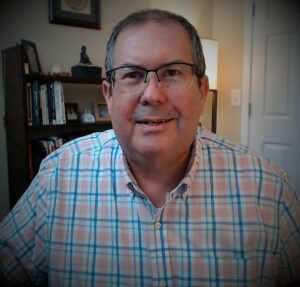
L. Gordon Brewer Jr., LMFT |Podcast Host – Gordon has spent his career in helping professions as a licensed therapist, counselor, trainer, and clergy person. He has worked with 100’s of people in teaching them the how to better manage their emotions through self-care and the practices of kindness and compassion. Follow us on Instagram and Facebook . And be sure to subscribe to our newsletter.

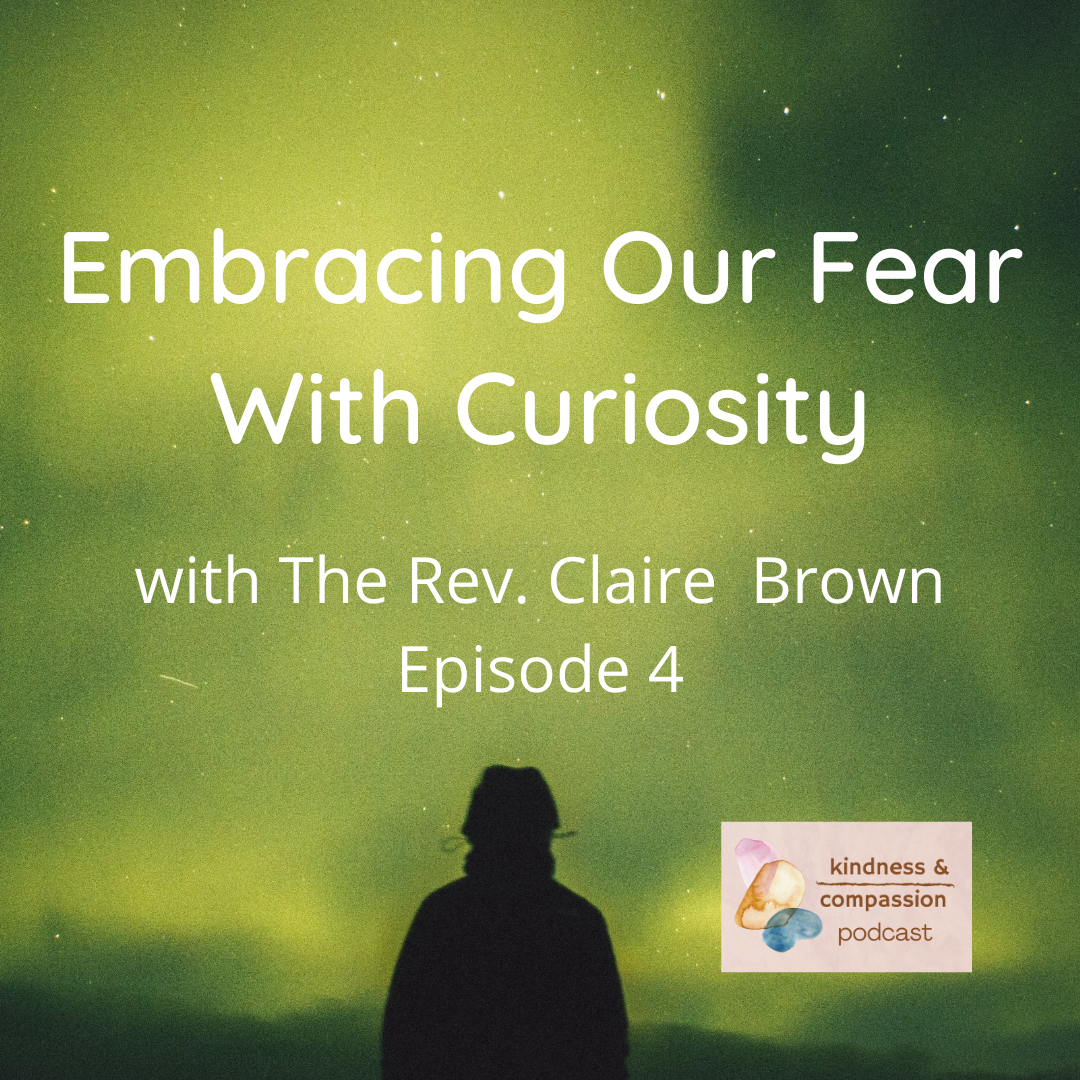
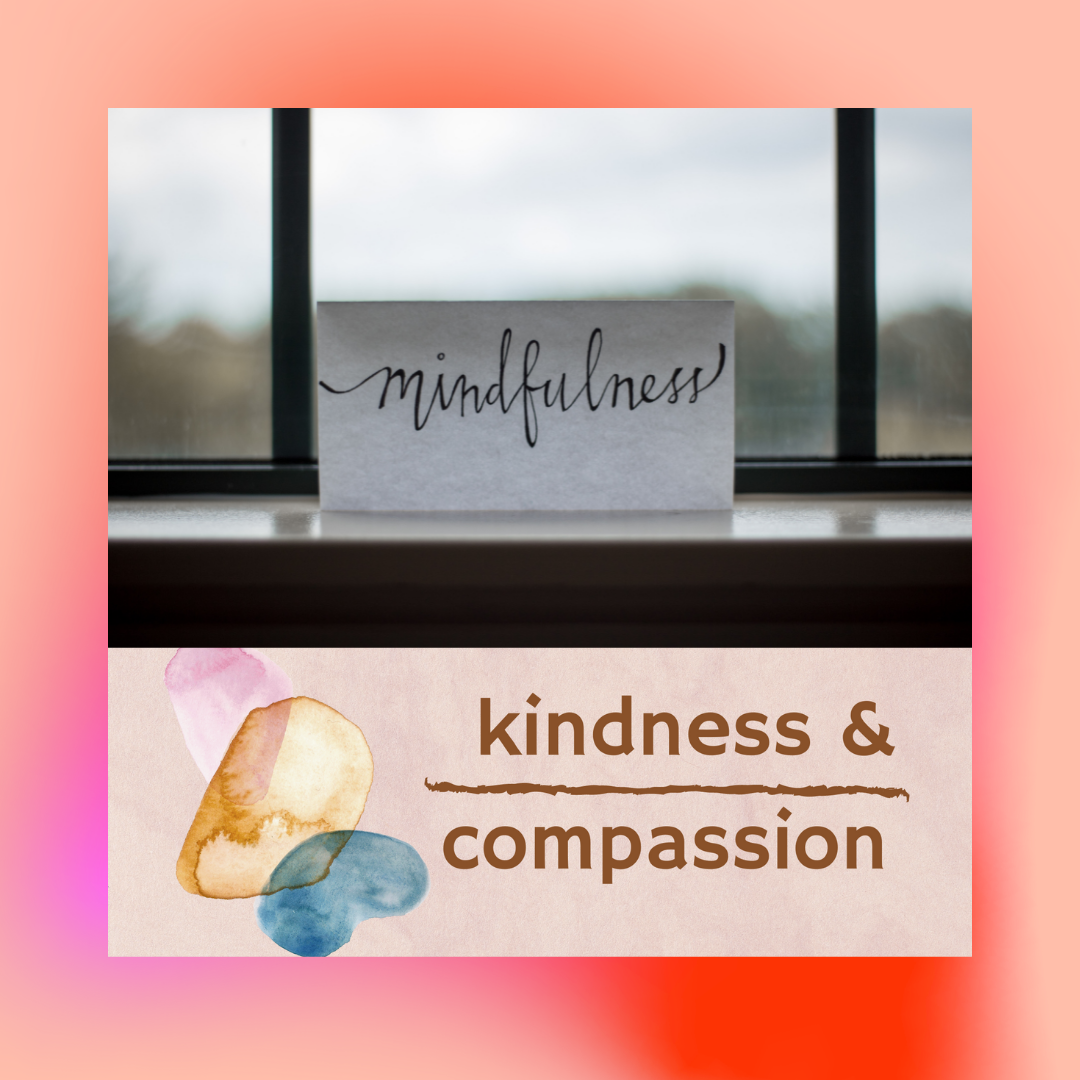
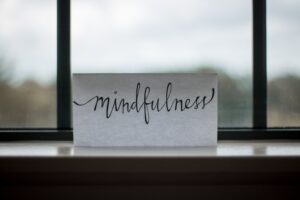
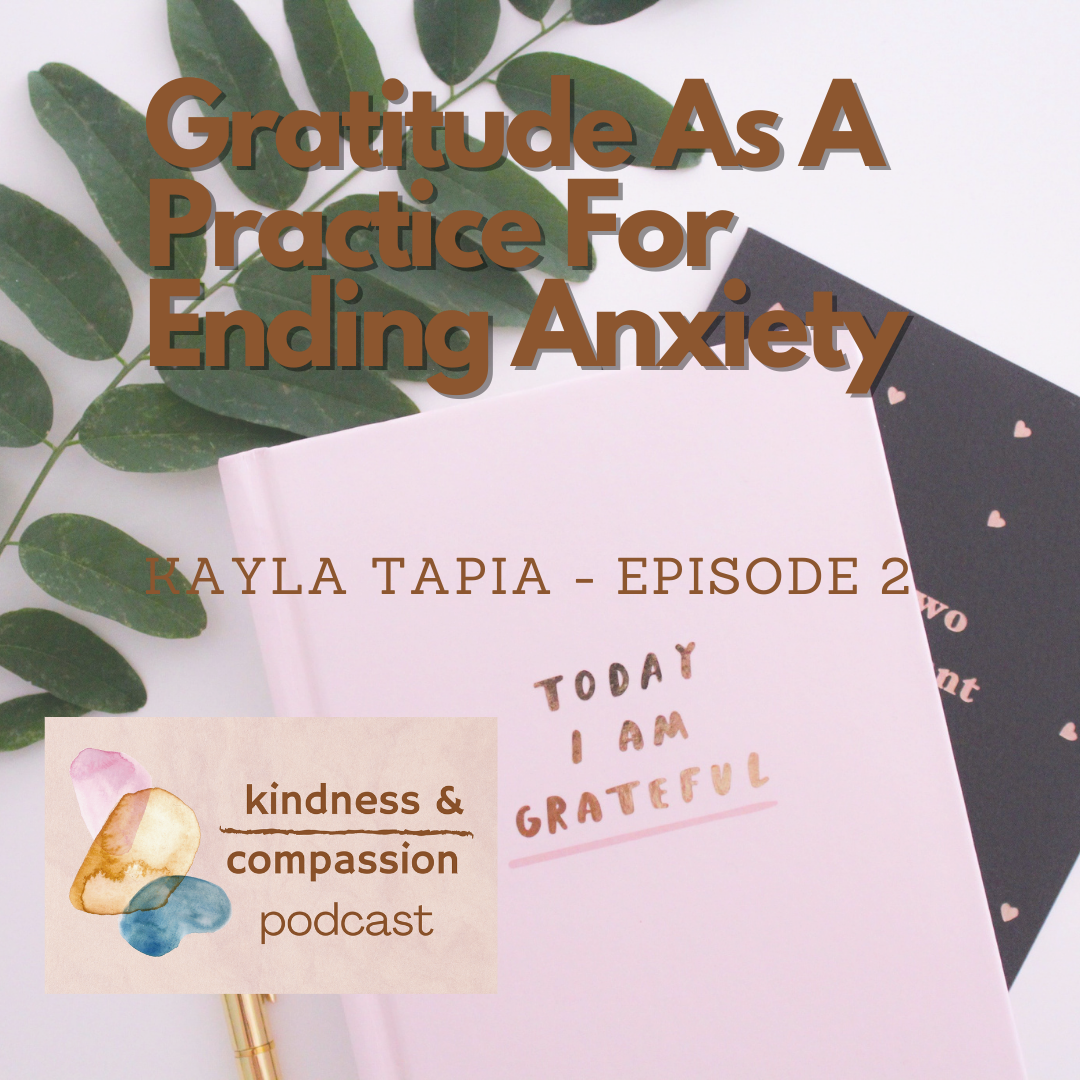

 Kayla Pennington Tapia is a counselor and therapist in private practice in Johnson City, TN. She is a native of the Appalachian region and is passionate about helping people find new ways to work through their “stuck” places.
Kayla Pennington Tapia is a counselor and therapist in private practice in Johnson City, TN. She is a native of the Appalachian region and is passionate about helping people find new ways to work through their “stuck” places. 
